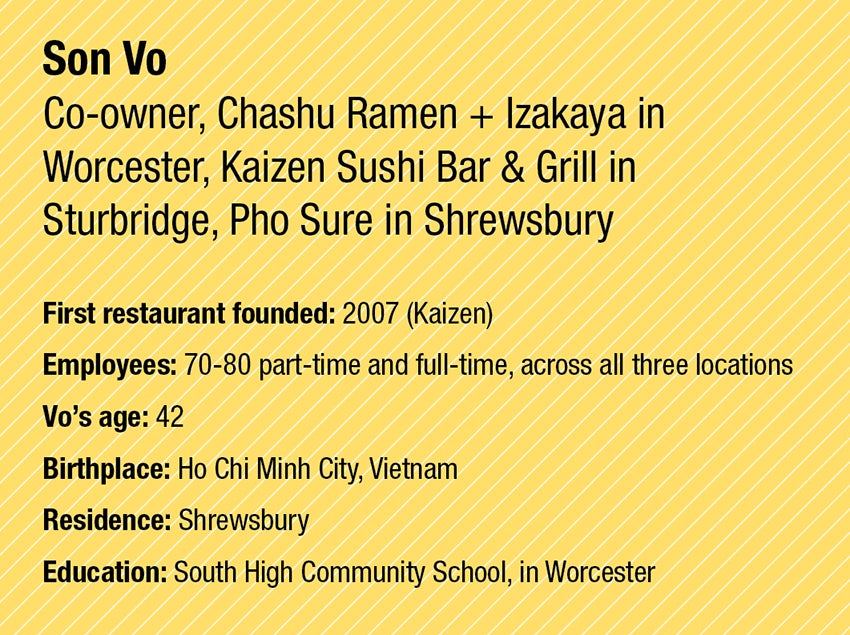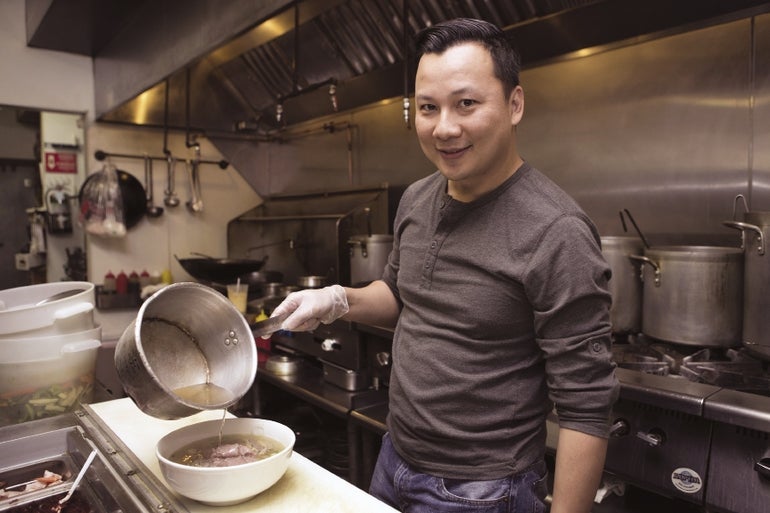The owner of the Vietnamese restaurant in Shrewsbury has purchased a Shrewsbury Street property with his sisters, where they are hoping to find more space and cost savings.
Get Instant Access to This Article
Subscribe to Worcester Business Journal and get immediate access to all of our subscriber-only content and much more.
- Critical Central Massachusetts business news updated daily.
- Immediate access to all subscriber-only content on our website.
- Bi-weekly print or digital editions of our award-winning publication.
- Special bonus issues like the WBJ Book of Lists.
- Exclusive ticket prize draws for our in-person events.
Click here to purchase a paywall bypass link for this article.
Son Vo owns three Central Massachusetts restaurants with three different sets of partners: Kaizen with his best friend from high school; Chashu with another friend; and Pho Sure with one of his sisters. In November, a corporation owned by Vo and three of his sisters bought for $1.4 million the shuttered Wexford House on Shrewsbury Street in Worcester from Richard Cravedi, with plans to move Pho Sure there in order to save on their lease payments.
Why did you buy the former Wexford House?
Pho Sure is going to move there eventually. It is a good location near where I want to be, yet still near our old location. It has a large parking lot, and the restaurant is almost double the square footage.
The former owner of the property financed the purchase for us, with a very low down payment. Now, we have to save our money so we can fix it up to where we want the property to be, to suit Pho Sure’s needs.

When are you moving?
It depends on how we do raising the money. We have three more years for our lease on the space in the White City Shopping Center in Shrewsbury, and we are going to keep that location to let customers know that we are moving. We’ll probably make the transition in 2024.
Could you end up with two Pho Sure locations?
I doubt it. The landlord at White City isn’t going to take that much off the lease, which is the main reason we are moving. Food and labor costs are both rising, and we can only raise our prices so much. Even if White City does lower my lease, my mortgage at Wexford is about half, and the space is like double.
I’m going from 2,400 square feet to 5,400. That space has all sorts of advantages, like having more storage space for food. Right now, we basically have to buy food as we need it for day-to-day use. This has been a problem during the coronavirus pandemic, when supplies are running short. At the end of 2021, we ran out of rice noodles, which are a main ingredient for us, because a factory shut down due to COVID. My brother had to drive to Virginia to get us rice noodles. With the Wexford house, we will have storage to stock rice noodles for several months.
How has business been since the pandemic began?
It has been a rough couple of years since the pandemic started, but we have come up with different ideas. At Pho Sure and Kaizen, we changed our business model a little bit, to be more takeout. For Chashu, we narrowed down the menu and tried to bring in more live music. We offered more specials.
Did your revenue drop?
2020 was a huge dip. We were closed for like a quarter of the year. For 2021, we were also down in revenue compared to 2019. We did have to close a few times, due to COVID among the staff. For Kaizen, the most was a 10-day shutdown. At Chashu, we shut down certain days of the week, and then we were able to open back up again. For the start of this year, some of my employees got COVID and the flu, so Kaizen and Chashu had to shut down for a few days.
We’ve had the lease at Chashu for five years now, but we didn’t open until 2020. I expected to open in 2019, but that got pushed back. With all that time on the lease, I hoped we would be in the black by this year, but we are still operating in the red.
For everything in the restaurant business, you have to think long term. If you are only thinking about opening a restaurant for three or four years, you aren’t going to make any money. It is usually at least five years before you start making any money. With the pandemic now, it seems more like seven years. Food costs are going up. Labor costs are going up. We have to sell a large quantity of food in order to make any money.
Are you having a hard time finding employees?
Definitely. That is why if we end up with just two people sick, we have to shut down. I’m working on the cooking line to fill in, but that isn’t even enough.
We get a lot of applications, but sometimes they don’t show up to the interview. We have entry-level and advanced-level pay, and if they want to get paid advanced-level, they have to start with some skill.
Are you paying more?
Before we only paid minimum wage for entry level, but now everything is $15 per hour. If you have more experience, then you get paid more, but you have to show me what skills you have first. If my staff or my chefs have to work harder to cover for those less experienced, it creates a bigger burden.
This interview was conducted and edited for length and clarity by WBJ Editor Brad Kane.

